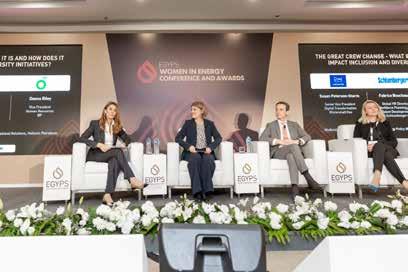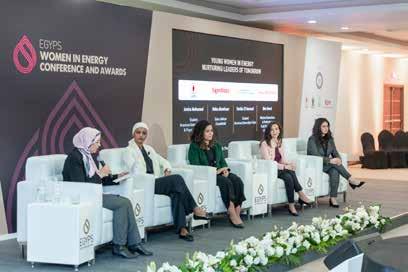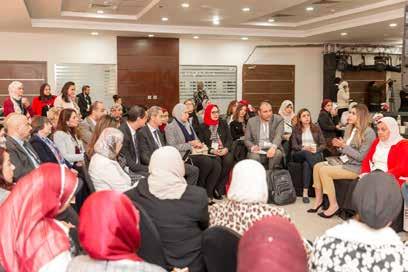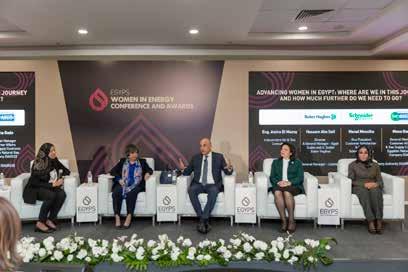
12 minute read
A BENCHMARK FOR EXCELLENCE: WOMEN IN ENERGY
Women involvement in oil and gas sector was the subject of a very rich debate by prominent global energy leaders and stakeholders, whogathered in five panels on the third day of the Egypt Petroleum Show (EGYPS 2020) to address the challenges the industry faces in achieving gender parity and inclusion. Creating a long-term forecast, strategy, and action plan to foster a sustainable, equitable, and inclusive industry of the future were targets of several renowned experts who took part in the debates.
ADVANCING INDUSTRIES AND ECONOMIES The Women in Energy conference started by a keynote address by Her Excellency Dr. Amani Abou-Zeid, Commissioner of Infrastructure, Energy, ICT and Tourism of the African Union Commission. Abou-Zeid addressed the importance of diversity for enhancing global economies and industries. According to her, the oil and gas industry needs to attain innovative technologies and strategies in order to boost the output to face the growing global demand in the Fourth Industrial Age. Hence, the need to have different mindsets is increasing, which makes it vital for the oil and gas leaders to diversify their workforce. Egypt does not only empower women in the energy sector, Abou-Zeid noted, but also the North African country is challenging the stereotypes tying women down, while guaranteeing their economic involvement in other sectors.
Advertisement
ECONOMIC EMPOWERMENT The Women in Energy conference went on to present a gender champions panel, entitled "The Importance of Gender Equality for Economic Empowerment." The panel had two prominent gender champions discussing equality:Shauna Olney, Chief of Gender, Equality and Diversity at the International Labor Organization (ILO); and Gielan El Messiri, Country Representative and Head of Office at the United Nations (UN) Women. The panel traced gender inequality 8,000 years back in the Neolithic Caves, where one gender used to dominate the other. This inequality has been decreasing over the years. However, the new markets require more work to achieve gender parity. The discussion further depicted the policies and frameworks that support gender equality and how governmental policies can help industries to include women. The champions talked about the evaluation mechanisms as well as resource needed to support effective policy delivery. Moreover, Olney and El Messiri discussed socio-economic barriers like the tradition that women working for money, and what can be done to overcome them. They further shared their views on shared responsibility and work-family balance, and what companies can provide to help women achieve this balance.
GREAT CREW CHANGE The second panel of the conference, entitled "the Great Crew Change - what it is and how does it impact inclusion and diversity initiatives?", had three main leaders in the oil and gas industry. The panelists were Donna Riley, Vice President - Human Resources (Upstream Regions) at BP; Fabrice Bouchaud, Global HR Director - Workforce Planning and Talent Development at Schlumberger; and Susan Peterson-Sturm, Senior Vice President Digital Transformation at WintershallDea. The panel was moderated by Liana Gouta, Group Director - Energy Policy & International Affairs at Hellenic Petroleum. The oil and gas industry is expected to witness a great change in its crew as almost 75% of its workforce is aged over 50 years, while around half of the employees are believed to retire during the upcoming seven years. The panelists discussed the measures taken by the sector to face this change as the oil and gas companies, which according to Bouchaud "operate in a marketplace characterized by high levels of volatility, uncertainty, complexity and ambiguity." Hence, it is important to diversify the workforce and include everyone in the workplace. Peterson-Sturm highlighted that at WintershallDea she "has 4,000 pioneering colleagues from60 nationalities in13 operating countries and that diversity is the company's strength." Moreover, the panel discussed the best practices followed by different nations to attract millennials, professionals, and the Gen Z to the oil and gas industry. Riley noted that the oil and gas sector would be coming to "a generation of future employees" who would be looking for "an organization that offers flexibility." The industry is hiring people to lead new-tech driven roles that did not exist in the past. Therefore, companies are working and preparing for new roles that might exist in the future.
ENERGY ROUNDTABLES To give room for discussion, the conference had two interactive roundtable discussions. The first roundtable, entitled "women on boards, the importance of a gender diverse boardroom to optimize company performance" was led by Yehia El Husseiny, Corporate Governance Project Manager at the International Finance Corporation (IFC). The roundtable discussed the importance of employee experience and how it could be polished through programs and initiatives, boosting profitability and growth. Moreover, El Husseiny reviewed workplace inclusion policies, focusing on how they benefit business strategies. El Husseiny talked about how the IFC conducted researches to show company boards the importance of including women and the financial gains that can be achieved for each company because of this. This led the Financial Regulatory Authority (FRA) to announce that boards of directors should have at least one woman. El Husseiny expressed his delight that the FRA did not set a percentage for the quotaof women inclusion in the boards of directors as many people are "against quotas because they are a stamp against women," and that women would like to be included because of their potential, not just to meet a quota. The second roundtable, entitled "Learning from Mentors and Eventually Becoming One," was led by Iman Wafy, DCT Assistant Chairman at Pharaonic Petroleum Company; and Karim Soliman, DCT System Supervisor at Pharaonic Petroleum Company. The roundtable tackled the factors identifying a good mentor and how to seek one. Mentoring and guidance is important for women to climb their career ladder in the oil and gas challenging industry. The oil and gas sector does not "have structural professional programs for mentoring, especially in the governmental part of the oil and gas. There is a desperate need for such program as they will help women in energy to move forward through their career," Wafy said, adding that the sector "needs to work together with IOCs partners to start structuring something formal for these mentorship programs in the oil and gas sector especially for the candidates coming back from the Middle Management program, as they need a lot of mentoring throughout their career progression." A woman should be sought more to mentor another woman, as "statically women tend to go to women to mentor them," Wafy noted. However, many of the attendees talked about how they were well mentored by a male senior. Mentoring is one of the most powerful and very good tools that women can use," Soliman stated, adding that "to seek a mentor is a very easy step in one's organization, because the person knows who is reputable in his/her organization."

Melissa Jones, Global Manager of Business Development - Downstream and Chemicals at Bechtel; Nana Sarajishvili, Head of Pricing – EMEA at Chevron; Tracy Josefovsky, Vice President – Human Resources at Halliburton; and Yasmine El Sayegh, General Manager - Commercial Excellence (Global Upstream & Integrated Gas) at Royal Dutch Shell, led another panel and a live question and answers (Q&A) session addressing "the Roadmap to Achieving Gender Diversity Across all Levels of the Oil & Gas Industry." The panel tackled ways for companies to enhance recruitment methodologies in order to enable equal opportunities for both women and men. Industry leaders have to recognize the challenges faced in the hiring process for leadership positions, according to Jones, who explained that when Bechtel is "bringing people into the organization, one of the efforts they try to make is to ensure that there are diverse candidates being selected for the interviews for these positions; that means men, it means talented women. It also means other underrepresented groups." The panelists further talked about the programs that could enable women to develop their career and broaden their expertise in the oil and gas field. Josefovsky discussed the importance of fulfilling employees, highlighting Halliburton’s recommendations and models such as providing child care support and parental leaves for both moms and dads. Furthermore, El Sayegh pointed out the importance of culture explaining that "in Shell, people believe everybody is entitled," adding that "regardless of one's ancestry, one’s age, one's color one's gender, or one's preferences, Shell wants everybody to come at the office and be the best selves that they can be." The session discussed gender equality audits that help oil and gas firms to assess the progress of their gender inclusion plans. "Diversity means that you have a prospect of people from different backgrounds who are part of the team, but the inclusive part is what makes their ideas and contributions meaningful for the organization. And so what is important in that aspect is to ensure that everyone has a seat at the table, and that their opinions are asked for," Jones stated.
YOUNG LEADERS Afterwards, a group of young women led a panel to discuss nurturing leaders for the future. The panelists were Heba Aboelnasr, Automotive Lubes Sales Advisor at Exxonmobil; Farida El Harouni, Student at the American University in Cairo (AUC); Rim Henri, Wireline and Perforation Field Professional at Halliburton; and Amira Mohamed, Student at the AUC. The four women were selected as finalists in EGYPS 2020 Women in Energy Awards from the Next-Gen Female of the Year and STEM Star of the Year categories. The panelists discussed pursuing STEM studies, while focusing on parental expectations compared to personal goals. Aboelnasr talked about her experience working in the oil and gas sector and how this actually brought her closer to her child. She advised young women in energy to "not shy away from who they are; they do not have to act all sure to fit in a male dominated industry, they donot have to act like a man. Science actually says that women have higher emotional intelligence than men. That is a fact and no one could argue with that. In that point, emotional intelligence is a key to any negotiation." El Harouni was the youngest lady in the panel, who talked about her internships and what inspired her to join the oil and gas industry as an undergraduate research assistant. She expressed her belief in the butterfly effect and how she thinks that her smallest actions could affect the industry. She thinks that the "oil and gas industry internationally has been always introducing some renewable aspects for sustainability, for example. This is the future, because sustainability is thinking about future generations, what will future generations be working in, and the footprints that we are leaving for them as well." Meanwhile, Mohamed talked about how she has been developing herself, pointing out to the support she received from her family and from her colleagues. She advised everyone to support and help eachother to progress and develop their career paths. Henri also shared with the attendees what got her into the oil and gas sector in the first place, referring to the socio-cultural challenges she had to deal with. She noted that not only strong women can pursue jobs in the oil and gas field, because even if they were shy, the oil and gas sector changes women giving them strength to progress. ADVANCING EGYPTIAN WOMEN The women in Energy Conference was concluded with a panel entitled "Advancing Women in Egypt: where are we in this journey and how much further do we need to go?" The panelists were Engineer. Amira El Mazni, Independent Oil andGas Consultant; Hussam Abu Seif, Director & General Manager - Egypt, Sudan & S. Sudan at Baker Hughes; Manal Messiha, Vice President - Customer Satisfaction & Quality at Schneider Electric; and Mona Gado, General Manager - Customer Affairs & Gas Supply Contracts at GASCO. The panelists evaluated the progress of the Ministry of Petroleum and Mineral Resource's structural reform in the Modernization Project. Additionally, the panel talked about the Modernization Project's training and development initiative and how they affect the Egyptian workforce transformation. Gado talked about how modernization is empowering women, as the Egyptian constitution and labor law are empowering them to climb their career ladder and work in higher positions. The panelists further talked about encouraging women to choose STEM studies, addressing the lack of women in the energy sectors . Messiha addressed the challenges faced in attracting women to have STEM education, stating that the mindset of the community is what ties women with the idea that they can or cannot work in the oil and gas sector. "Everyone needs to have a rolein their organizations and in their community to change the mindset of the team," she pointed out. Moreover, the panel discussed the cultural biases challenging women in climbing their career ladders and the importance of addressing these biases. El Mazni talked about her journey when she first joined the oil and gas industry around 36 years ago. She recalled that she had received trainings and was allowed to visit various fields and refineries in the sector, except in Ras Shokair, which was entirely believed to be a maledominated environment. Accordingly, she initiated trainings in the sector allowing women to go to Ras Shokair field and stay for two weeks. Moreover, panelists discussed how the Egyptian economy can be boosted through providing equal opportunities and equal pay for both genders. "Women now are a part of the sustainable growth, they are active members, they are well integrated in the work force of the petroleum sector and they are recognized not only at home as a cornerstone and a pillar of the family, but also as a productive citizen that brings productivity and increases the income and revenue of the country," Gaso said. Abu Seif took up the assessments to identify female talents, noting that the Middle Management Program is a great step. "The outcome of such a program, that Baker Hughes also pursued, is to build an assessment of the leadership criteria that the sector has in its progress," he stated adding that the "program gave a great opportunity to build assessment procedures to help identify gaps and from these gaps concentrate more technically on whether they are good on decision making, and whether they are able to work in teams."







